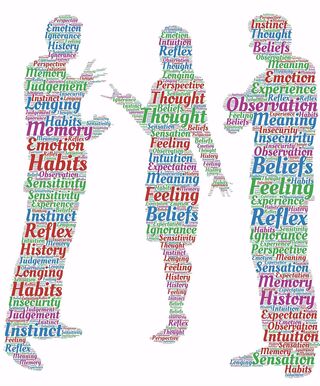Decision-Making
The Limits of Rationality in Civic Conversations
Part 1: Strong emotions on two sides of a conflict can lead rationality to fail.
Posted November 22, 2021 Reviewed by Abigail Fagan
Key points
- The standard views of rationality are best traced to the renowned philosophers Hannah Arendt, Jürgen Habermas, and John Rawls.
- Standard views of rationality in civic conversations fail to account for how facts, values, and emotions influence our thinking.
- Asking people to be rational may be felt as if they are being told to forget their collective and personal identities.

The proponents of civic conversations claim that civic conversations bring many benefits to civic life such as valid objective opinions, constructive communication, dismantling of stereotypes, enlightenment, listening to and understanding the other, and rational decision making.
According to its proponents, civic conversations are beneficial for democratic societies because they provide a structured setting for citizens to meet across different backgrounds. And in such settings, the theory goes, everyone has a voice and a way to use that voice in a rational, inclusive, solutions-oriented conversations that will connect directly to action and change.
Also, proponents of civic conversations claim that they are beneficial for fostering critical thinking and moral reasoning, and therefore, citizens are more likely to make rational decisions on divided public policy issues.
Rational Discourse about Polarizing Topics Become all but Impossible
However, it is often difficult for people to stay rational during civic conversations on social issues. Rational discourse about polarizing topics become all but impossible. According to a new Pew Research Center report, the United States is one of the most conflicted societies when it comes to questions of social issues.
A majority of Americans say there are strong political, racial, and ethnic conflicts in the U.S. and that most people disagree on key facts. The Pew findings reveal that about seven in 10 Americans say there are conflicts between people with different ethnic or racial backgrounds (Connaughton, 2021).
The Psychological Tendency of Belief Perseverance
Rationality in civic conversations can be a bond between people, but it is not a very reliable one, and often fails when there are strong emotions on two sides of a conflict. The demand to be rational in civic conservations is daunting for people because it militates against the human tendency to cling to one’s inbred belief systems, a phenomenon known as belief perseverance.
In other words, new facts can be “heard” and merely interpreted in ways that reinforce an individual’s original mindset. Each side in the conflict has a mindset — a set of beliefs and strong feelings about their beliefs — that is designed to support their views and so conversations can turn into an argument that goes round and round in a loop.
When “Never forget the Holocaust or never forget Slavery or never forget Gender Inequality or never forget Historical Injustices” is uttered in conversations, it probably would be counterproductive to reply: “Be rational and forget the injustices of the past, the past is gone and cannot be changed, it is more rational and reasonable to talk about the present.” Asking people to be rational may be felt as if they are being told to forget their collective and personal identities.
Standard Views of Rationality in Civic Conversations
Hannah Arendt’s political theory of engaged citizenry
The standard view of rationality in civic conversations does not take into account people’s strongly felt collective and personal identities. The standard view of rationality is best traced to the renowned philosophers Hannah Arendt, Jürgen Habermas, and John Rawls. These influential philosophers theorized that civic conversations were essential for cultivating rationally engaged democratic citizenry.
Consider Hannah Arendt’s political theory of engaged citizenry. Arendt theorized that debate and discussion would enlarge citizens’ perspectives and help form opinions that could claim more than just subjective validity (Arendt, 1961, p. 241). For Arendt, the validity of an opinion or judgment depended on a person’s ability to think ‘representatively,’ so they could look at the world from a number of different perspectives.
So, according to Arendt’s political theory of engaged citizenry, it was essential for citizens to meet to deliberate matters of public concern. For Arendt, civic conversation was the best form of citizens’ power because it rested on rational persuasion that would result in impartial judgment (d'Entreves, 1993).
Jürgen Habermas's theory of public debate
The philosopher Jürgen Habermas also believed in the power of discussion and rationality for overcoming subjective dogmatism. Habermas’ work focused on the importance of public civic dialogues for fostering rational critical discourse (Habermas, 1962/1989, p. 52).
Habermas asserted that people could propose or accept or reject each other’s claims to truth and rightness on the basis of a ‘rational better argument’ — through persuasion, reason and logic — and that people should be motivated only by a wish to achieve mutual understanding. According to Habermas, the public sphere where such ideal communicative dialogues could take place could then serve as a model of free and open public discussion within liberal democratic societies.
John Rawls's theory of justice
Lastly, like Arendt and Habermas, John Rawls, the renowned moral and political philosopher, also emphasized the importance of civic conversations. However, unlike Arendt and Habermas, Rawls questioned whether civic conversations actually resulted in objective opinions. Rawls claimed that people were limited in their abilities to reason and to be objective and unbiased (Rawls, 1971, p. 314).
To address these limitations, Rawls posited that what was needed in civic conversations were “… a set of rules well-designed to bring to bear the greater knowledge and reasoning powers of the group so as best to approximate if not to reach the correct judgment” (Rawls, 1971, p. 315).
For Rawls, a set of rules would guarantee that people be rational, impartial and able to assume a viewpoint and position where their self-interests were not considered. Rawls stated: “Impartiality prevents distortions of bias and self-interest;... (Rawls, 1971, p.163). Rawls called the set of rules the “original position.”
Briefly, Rawls’ original position asks people to imagine themselves in the place of free and equal persons who agree upon principles of justice. The main aspect of the original position is “the veil of ignorance.” To ensure impartiality of judgment, people are ignorant of all knowledge of their personal qualities and social and historical backgrounds. They do not know their place in society, their class or social status; nor do they know their abilities, their level of intelligence or economic standing and the like (Stanford Encyclopedia of Philosophy).
According to Rawls, by being ignorant of their circumstances people could then objectively discuss social policy issues. He asserted that behind a veil of ignorance all cognitive biases would disappear, and people would make rational decisions. Rawls described people’s capacity for objective decisions as ‘deliberative rationality’ (Rawls, 1971).
Summary
In summary, the seminal philosophers Rawls, Arendt, and Habermas claimed the crux of democracy is the ability to engage in rational civic conversations. The standard views of Rawls, Arendt, and Habermas, as summarized above, emphasized the notion of rationality in civic conversations.
With respect to people’s decision-making abilities, all three standard theories stress the importance of making decisions through reason and deliberation of competing arguments and viewpoints. Rawls, Arendt, and Habermas believed that political and social decisions ought to be the product of reasonable dialogues and debates among people.
They theorized that during rational deliberations, citizens would exchange arguments and consider different claims that were meant to secure the public good. Rawls, Arendt, and Habermas claimed that people would be won over and persuaded by the force of the better argument rather than by private concerns, beliefs, or views that were not publicly justifiable to their fellow deliberators.
In essence, the main notion of these standard theories of civic dialogue is the idea of rational conversation itself. When people converse, the theories claim, people exchange views and debate their supporting reasons concerning public, political, and social issues. According to the theories, conversations would allow people to be persuaded in their decision making by rational considerations.
Does Rational Deliberation Actually Work in the Real World of Civic Conversations?
An important question, however, is whether rational deliberation works in the real world of civic conversations or is overly enthusiastic. Perhaps social and psychological factors lead deliberating groups in unanticipated and unfavorable directions? If so, it might be worthwhile to rethink current enthusiasm for rational deliberation as the sole method for civic conversations.
While rationality may be desirable and possible in some circumstances of civic conversations, empirical data suggest that it may not be adequate as the sole basis for discussing polarizing, value-laden political and social issues. The standard theories of civic conversations, as mentioned earlier, fail to take into account the psychological makeup of people including their experiences, values, histories, memories, and identities.
Indeed, one might surmise that even Arendt, Habermas and Rawls were not able to avoid these social psychological effects, since their own decisions about what to include in their theories may have derived from their personal experiences. Biographical accounts of these three influential philosophers suggest they were drawn to participatory democracy and were enthusiastic about rational deliberations for civic dialogues because they witnessed first-hand the noxious and deleterious effects of totalitarianism, Nazism, and World War II.
By tracing Rawls’, Arendt’s, and Habermas’ personal and historical circumstances — and the political, social, and economic norms of the postwar years, as well as the ways philosophy was conducted then — it seems their theories of rational deliberation and their insights and judgments came to seem natural and influenced their decisions on what to include in their theories.
In addition, to the influence of personal experiences on a person’s decisions and choices as illustrated above, research in the decision-making sciences has also demonstrated that people are not always rational when making decisions. Key findings from decision science research suggest how people actually make decisions under a veil of ignorance.
Personal Identities
Kahneman and Tversky’s research, for which they won the Nobel Prize in economics, demonstrated the frame that a decision-maker adopts is controlled partly by the personal identity of the decision maker including the formulation of the problem, values, norms, habits, of the decision-maker. Rawls assumed that under a veil of ignorance people would make ‘rational’ choices and want an equal society. However, Kahneman and Tversky’s research shows that people’s framing of probability decisions is class dependent. For instance, poor people are more likely to overestimate the low probability of becoming wealthy in a non-egalitarian society.
Under the veil of ignorance, Rawls would expect people to prefer an egalitarian society, since they would not wish to be poor or live in extreme poverty. However, Kahneman and Tversky’s research shows that poor people might overvalue the possibility, however unlikely, of being very wealthy—because they put too much value on the mere possibility. Consequently, poor people might make “irrational” decisions in support of income inequality and an unequal society.
Rawls expected people to ignore their circumstances when judging a society and focus on avoiding the risk of poverty. However, research in decision making illustrated that under a veil of ignorance, a poor person is unlikely to judge a society in the same way a wealthy person would, because people do not use absolute metrics, but instead, they use their own personal reference points.
Insights from clinical and social psychology and decision science research have come to question the widely held view of people as rational agents who deal with decisions, probabilities, and civic conversations in a rational way.
If we know that people are not rational agents and instead, are laden with emotion, history, biases, and identities, how should we approach civic conversations? In my next article, I will discuss a new approach using the Science of Diversity TM educational method in civic conversations.
Copyright Mona Sue Weissmark 2021; All Rights Reserved
References
Arendt, H. (1961). Between past and future. Viking Press.
Bohman, J. & Rehg, W. (2014, August 4). Jürgen Habermas. Stanford Encyclopedia of Philosophy. https://plato.stanford.edu/entries/habermas
Connaughton, A. (2021, October 13). Americans see stronger conflicts than people in other advanced economies. Pew Research Center. https://www.pewresearch.org/fact-tank/2021/10/13/americans-see-stronger-societal-conflicts-than-people-in-other-advanced-economies/
d'Entreves, M.P. (1993). The political philosophy of Hannah Arendt. Routledge.
Habermas, J. (1989). The structural transformation of the public square (T. Burger, Trans.). MIT Press. (Original work published 1962).
Rawls, J. (1971). A theory of justice. Harvard University Press.
Silver, L., Fetterolf, J., & Connaughton, A. (2021, October 13). Diversity and division in advanced economies. Pew Research Center. https://www.pewresearch.org/global/2021/10/13/diversity-and-division-in-advanced-economies/
Weissmark,M.S. (September 24,2020) Skeptic Magazine, Do Diversity Training Programs Work? Creating a Culture of Inclusion through Scientific Reasoning https://www.skeptic.com/reading_room/do-diversity-training-programs-work-creating-culture-of-inclusion-through-scientific-reasoning-mona-sue-weissmark/
Weissmark,M. (2020). The Science of Diversity . Oxford University Press. https://www.amazon.com/Science-Diversity-Mona-Sue-Weissmark/dp/0190686340




